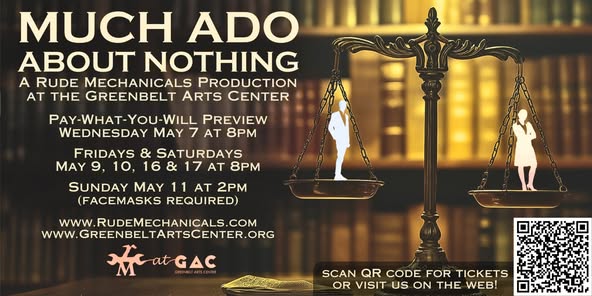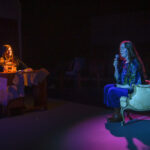It may be the opinion of some that I was born to speak all mirth and no matter, but one doth not know how much an ill word can empoison liking. Let’s hope that’s enough mangled lines from the Bard’s source material to bait the proverbial bear and get this review of The Rude Mechanicals’ Much Ado About Nothing underway. Directed by Shirely Long, this Shakespearean comedy about— well, mostly a fuss made over nothing, as the title might imply— is tightly paced, good-humored, albeit a little conceptually inconsistent, and ultimately a decent rendering of what could otherwise be a very long performance.

Technical Director Jeff Poretsky— handling lights, set, sound, etc.— does an impressive job of using the basic staging space at Greenbelt Arts Center to serve the show. Scenery is kept more minimal than some of the more recent Rudes’ shows, but that’s not to the show’s detriment, rather to its expedience and fluidity of scene change. If there’s a yen for something from Poretsky’s work its more of the projections utilized (predominantly pre-show and at the intermission) to fortify the show’s ‘scenic concept’, which from the costumes and a few of the projections appears to be ‘in-a-nondescript-law-firm.’ While there are some nice projections against the alcove-spaces of the back-stage— an atrium with greenery and a library or legal-study— there could be more done in this vein, particularly with the ‘adverts’ for various characters as legal council/judges/etc. The ‘adverts’ that were seen are quite clever and deserve more recognition.
The costuming for the show (conceptualized by the director and possibly provided in a combined effort on behalf of the actors and the company? The program doesn’t indicate any particular designer nor does it give credit directly to anyone in particular) does speak more toward the show’s concept than anything else, with crisp ‘legal-looking’ suits on all of the characters, including a laxadaisical ‘jeans and top’ concept for Beatrice, who is featured first at the desk on the computer almost like she’s the firm’s secretary or paralegal rather than ‘of the firm’ proper.
Director Shirely Long follows through on her concept of being in a law firm, at least in so much of her utilization of Dogberry and the Watch, decking them out like Paul Blart Mall Cop and a team of half-witted henchmen in dayglow ‘safety vests.’ Dogberry even gets a Segway to ride, which is hilarious, especially as he free-wheels around the stage on it during his first scene. Though one does wish for more use of this; you have it, you put it into the show— and as the actor playing Dogberry manages it divinely, why not use it for every scene he’s in (especially as the character is in so few) to heighten the comedy? Long takes the extra step to put the whirling ‘officer light’ on top of Dogberry’s helmet, which ramps up the humor so it’s a shame to not feature both that costume-prop and the Segway for all of his scenes. (While watching Dogberry run back and forth with his mincing shuffle-run during the ‘deposition’ with the baddies and the sexton (Chris Dullnig) is amusing…it would have been ten times more amusing watching him roll backward and forward using the Segway, especially given how hilariously the audience responded to his Segway use in his initial scene.)
Where Long brings some questionability into her directorial concept is the way she’s played around with gender roles. It’s merely inconsistent. We keep Benedick as a male character, being played by a female actress, in a male role, but change multiple other male roles to female roles (complete with pronoun and name change— John the Bastard becomes Joan the bastard and is referred to as Pedro’s sister, Claudio becomes Claudia, etc.) And while there’s nothing wrong with this approach, it’s just muddy as to what Long is attempting to present by doing so. Why not change Benedick to Bernadette or something of the like if the notion is to gender-flip the script? Or leave Claudio and John and have them played by women playing men like she’s done with Benedick? It’s unclear what the message/intention/idea is here. Though that doesn’t detract from the performers, as for the most part they’re all exquisite.
If you want chuckle-fluffery— ‘The Watch’ provides it. With Samuel Kopel as Seacoal, the rather straight-n-narrow of the dunderheaded bunch, you get his earnest sensibilities to, well, make sense of all the other tomfoolery happening in those moments. Liana Olear, as Oatcake, and Jaki Demarest and Alan Duda (as watch three and four) alongside Kopel’s Seacoal get up to nonsense, as one might expect from any patrol being overseen by Dogberry (Daniel Douek) and earn themselves a great may chuckles from the audience, particularly when Duda and Demarest manage to handcuff themselves together beneath their legs. And poor Peter Ovrvetti, as Verges, who is essentially the stable-minded second-in-command to the lunatic Dogberry, he spends a great deal of his limited on-stage time sort of vocally rolling his eyes at the whole affair. Douek, as the clownish Dogberry, has an infectious stupidity that is well-spread amongst his charges, Kopel’s Seacoal notwithstanding, and really gets the audience going with his hand-heart and rolling around on that Segway.
Also providing a bit of fluff-n-humor to the performance in a bit-part cameo style role is Stuart Fischer as the Reverend. He may only appear for the nuptials but it’s quirky and good-natured. Fischer, much like a lot of the other scenery-chewing background characters— Artura (Joshua Engel, who does some Mutley-level snicker-laughing that is wildly entertaining), Margaret (Jenn Robinson), Antonio (Stephen Cox), Conrade (Monica Duckles)— have little moments that draw attention to themselves, many of which happening the back-to-back guiling scenes. While it would have been nice to see more scenery involved with both of these scenes— the way the respective pairs of Benedick and Beatrice work their physical comedy and antics in their respective scenes is more than humorous enough in creating the desired effect.

One of the most striking choices in this production is having the wandering minstrel/musician (Matt Etner) on stage strumming his guitar for Balthazar (Danielle Delgado) so that moments in song are accompanied by delightful, live acoustics. Delgado has a robust and hearty voice which is beyond lovely and when she’s meant to sing the mournful tune at the tomb when the certain characters hang an epitaph for a certain ‘died of slander’ character, Delgado breaks out into a beautiful rendition of “If I Die Young” and it really enhances the overall experience of this scene.
Our two ‘elder statesmen’ as it were— Leonato (Scott Farquhar) and Antonio (Stephen Cox)— have a solid functioning chemistry. Watch Cox’ facial expressions carefully when Farquhar mentions how Antonio has another daughter in the whole ‘thou shall marry to make amends’ scene with Claudia. Farquhar does a lot of bombastic ‘in-thy-face’ moments when in the second act, and his rage at young Hero is on par with any furious Shakespearean father when he thinks he has to verbally lambast his daughter back into place.
True villainy in this production lies in portrayal of Borachio (Steven Wilson), who seems to surge with his sense of stage presence, mischievous mindfulness and his overall sense of being an antagonizing irritant. Wilson boasts boldly of his conquest— and the ‘digital display’ of how they handle that whole affair is actually a really cool trick of technology (well done, Jeff Poretsky!) Wilson’s Borachi is the villainous knave of the show, in the employ of Joan the Bastard (Joann Robertson) and when he and Conrade (Monica Duckles) find themselves apprehended…and woefully mishandled in the vein of hilarity…by Dogberry and The Watch, it’s really entertaining and highly amusing.
Wes Dennis, as Pedro Prince, has the most adorable two-second meet-cute in the entire show at the very conclusion when he bumps into Balthazar. When he’s not looking adorably awestruck, Dennis’ Pedro helps to lead the charge in the back-to-back guiling scene, him, Farquhar’s Leonato, Claudia Bach’s Claudia, and Cox’ Antonio ham it up and overdue the “but Beatrice doth truly love him” bit. Watching Benedick (Erin Nealer) respond in kind is where the true heart of humor in this production lies.
Enter our quadrangle of lovers, which are really only two-and-two, but the word quadrangle is fun to type and highly underrated. Beatrice (Rebecca Korn) and Benedick (Erin Nealer), then Hero (at this performance Marianne Virnelson) and Claudia (Claudia Bach.) While they rarely spend time together as a four-set, they do have respective scenes playing off and around one another which adds to both the natural progression of this performance and the overall humor of this take on Much Ado. It can be said unquestionably that these four performers have the sturdiest handle on their textual conceptualization of Shakespeare’s words and in the emphatic emotional delivers, bearing in mind that most of the emotional charges in this particular play are either biting sarcasm, dire woe, or twitterpated ridiculousness…aka LOVE.
Watching Korn crab-walk, turtle-flip, and flounder around on the floor during her guiling scene behind the cart is uproariously funny. Watching Nealer’s Benedick try to make that fall and collapse beneath the ‘greenery screen’ look intentional is equally humorous. The pair have delightful biting chemistry which quickly mellows into that curious emotion of love and when they take sincere moments together after the ‘Hero Incident’ it showcases both Korn and Nealer’s versatility as performers, showing how easily they can transition from humor to stoicism in just a mere blink of an eye. Watching the pair of them, though note that the scene occur separately, lose their minds in giddy stupidity over the notion that each one is in fact loved by the other, is priceless. Virnelson’s Hero and Bach’s Claudia have a more tempered, even-keeled chemistry, all sweet and tender until it isn’t. And both Bach and Virnelson do a fine job of egging on their respective counterparts’ interests in the guiling scenes.
There’s all sorts of little nonsense moments sprinkled throughout the performance— like the ball scene with the odd glasses and hilarious face masks…which are printout of various actors faces. And the show moves quickly, rendering Much Ado About Nothing to a palatable and easily ingestible two hours (including the intermission), a signature for which The Rude Mechanicals is often lauded. As you hear of The Rudes, so think of them. And buy tickets to their show.
Running Time: Approximately 2 hours and 5 minutes with one intermission
Much Ado About Nothing plays through May 17th 2025 with The Rude Mechanicals, in residence at The Greenbelt Arts Center— 123 Centerway in downtown Greenbelt, MD. For tickets call the box office at 301-441-8770 or purchase them online.





